Award-Winning Chicago Personal Injury Lawyer - Securing Justice
for Illinois Injury Victims - Over $450 Million Recovered
A top-rated Chicago slip and fall attorney from Rosenfeld Injury Lawyers helps people injured on someone else’s property due to an owner’s negligence.
Our team has resolved over 5,000 successful cases and is recognized by Super Lawyers. With a 10/10 Avvo rating, we’ve recovered more than $500 million in settlements and verdicts for our clients.
With decades of experience, we can handle any type of slip and fall claim. Contact us for a free consultation today.
If you’ve suffered an injury in a slip and fall accident in Chicago, you might be wondering if you truly need legal representation. The answer is almost always yes. While every case is unique, hiring an experienced Chicago slip and fall attorney significantly increases your chances of securing the compensation you deserve and navigating the complexities of the legal system.
Here’s why having a dedicated slip and fall lawyer from Rosenfeld Injury Lawyers on your side is crucial.
Understanding Complex Premises Liability Laws
Illinois’s Premises Liability Act (740 ILCS 130) dictates the duties of property owners. A skilled attorney understands these nuances, recent legal developments, and how they apply to your specific situation, including the intricacies of proving negligence and the property owner’s duty of care.
Proving Negligence and Liability
Establishing that a property owner was negligent and directly caused your injuries is the cornerstone of a successful slip and fall accident claim. This often involves:
Dealing with Insurance Companies
Insurance adjusters are trained to minimize payouts. Without legal representation, you risk accepting a settlement that is far less than your case is worth. Our attorneys have decades of experience negotiating with insurance companies, ensuring your rights are protected and you receive fair compensation for all your damages.
Calculating Full Damages
Many victims underestimate the true cost of their injuries. Beyond immediate medical bills, a slip and fall can lead to lost wages, future medical expenses, rehabilitation costs, and significant non-economic damages like pain and suffering, emotional trauma, and loss of enjoyment of life.
We meticulously calculate both economic and non-economic damages to pursue the maximum possible recovery.
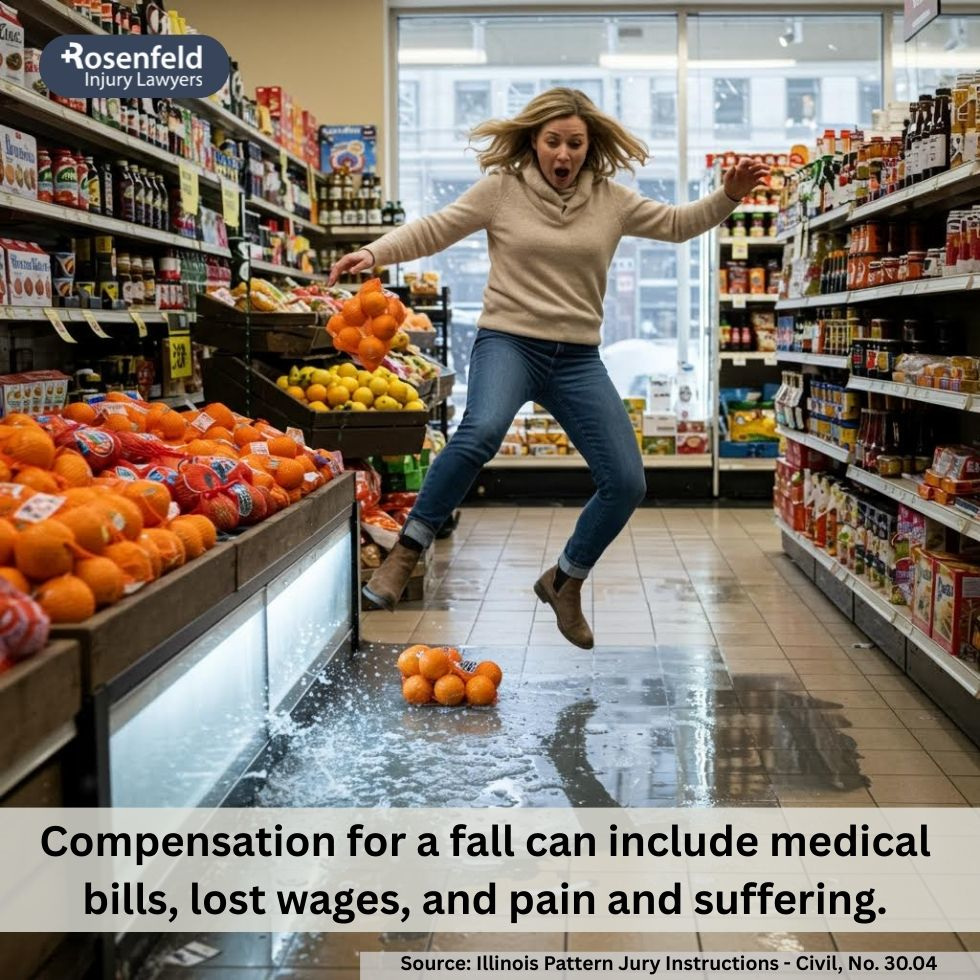
Navigating Comparative Negligence
Illinois follows a modified comparative negligence model (735 ILCS 5/2-1116). If you are found to be 50% or more at fault for your accident, you cannot recover compensation. An attorney can argue against allegations of your fault and protect your claim.
Adhering to Strict Deadlines
The statute of limitations for personal injury claims in Illinois is generally two years from the date of the accident (735 ILCS 5/13-202). Missing this deadline can permanently bar your claim. Our legal team ensures all paperwork is filed accurately and on time.
Focusing on Your Recovery
Dealing with the aftermath of an injury is stressful enough. By entrusting your case to our experienced attorneys, you can focus on your physical and emotional recovery while we handle all the legal complexities.
Don’t wait to seek legal guidance. The sooner you contact us, the easier it will be to gather crucial evidence and build a strong case. Contact Rosenfeld Injury Lawyers today for a free, no-obligation case evaluation. We handle slip and fall accident cases on a contingency fee basis, meaning you don’t pay unless we win.
At Rosenfeld Injury Lawyers, we’ve recovered significant financial compensation for fall victims across Chicago and beyond. Below are some examples of our recent settlements:
This list is not exhaustive, and our Chicago personal injury lawyers continue to secure significant results for those hurt in slip and fall accidents.
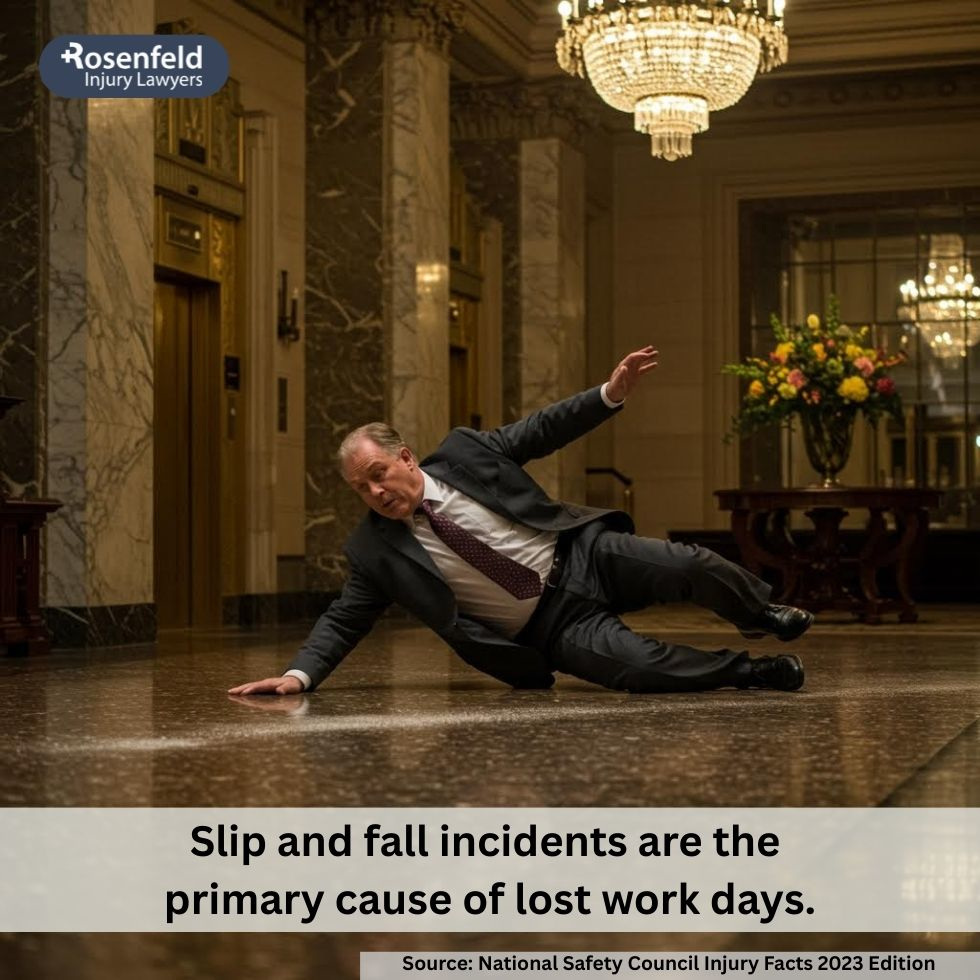
Under the Illinois Premises Liability Act (740 ILCS 130), the state treats invitees and licensees the same, and property owners and occupiers have a duty to keep their premises safe for all visitors.
This law establishes a basic rule of reasonable care, meaning owners must address hazards or warn guests about them to prevent injuries.
An example of reasonable care is promptly mopping up a spilled drink in a grocery store and placing a warning sign to alert customers of the wet floor. But if it’s left unattended for three hours, that’s typically seen as negligence.
If someone violates this duty of care and you’re injured as a result, you could be entitled to compensation for any injuries resulting from your slip and fall accident.
Slip and fall accidents can cause far more than a temporary inconvenience—they often result in serious injuries that disrupt a person’s health, mobility, and overall quality of life. At our firm, we’ve represented clients facing a wide range of slip and fall injuries, including:
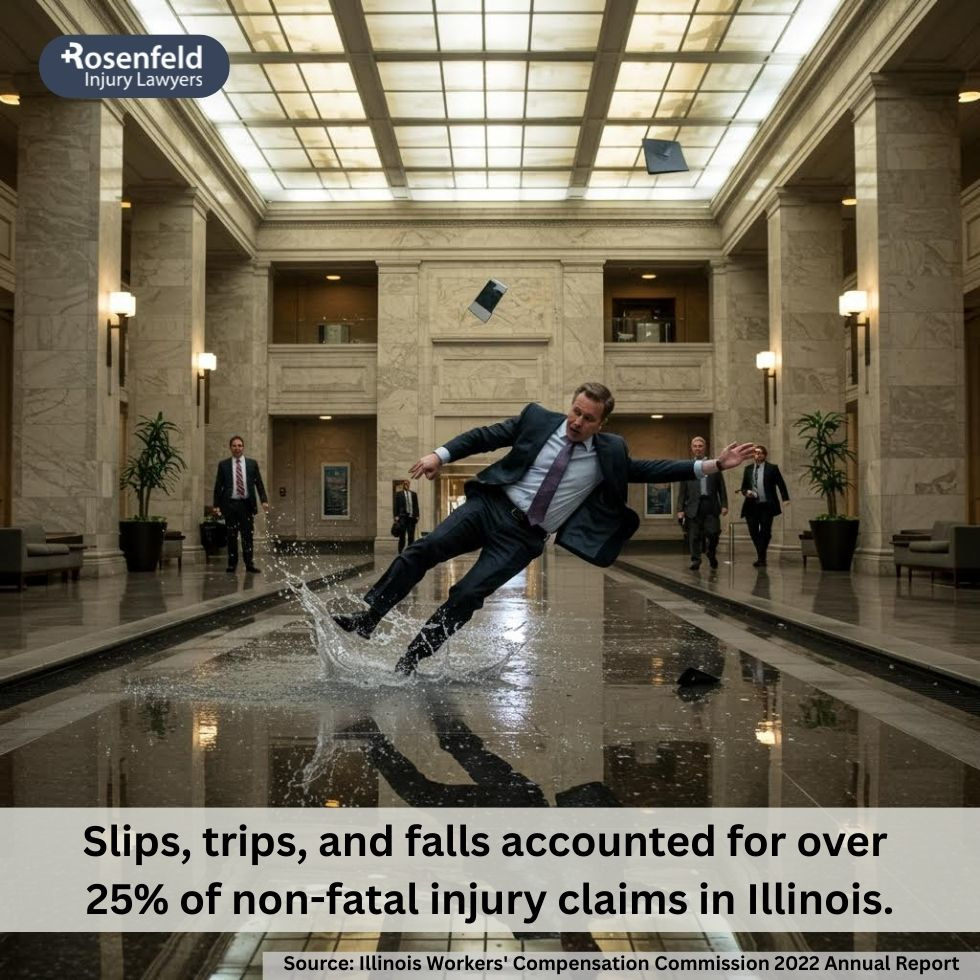
There are primarily two kinds of damages you can recover in a slip and fall accident case – economic and non-economic damages.
Economic damages related to tangible financial expenses you incurred as a result of the serious injuries you sustained in your fall, such as:
Non-economic damages aren’t related to financial losses. Instead, they relate to subjective factors, including:
Under 735 ILCS 5/2-1115.05, punitive damages in slip and fall accident cases are awarded to punish the defendant for particularly harmful behavior and to deter similar actions in the future.
They can only be given when the defendant acted with an evil motive or showed reckless and outrageous indifference to a highly unreasonable risk of harm.
In one example, $140 million in punitive damages were awarded to the estate of Elvira Nunziata, a nursing home resident who died after falling down a stairwell while strapped into her wheelchair. The jury found the facility acted with reckless disregard for resident safety, amid widespread neglect and understaffing.
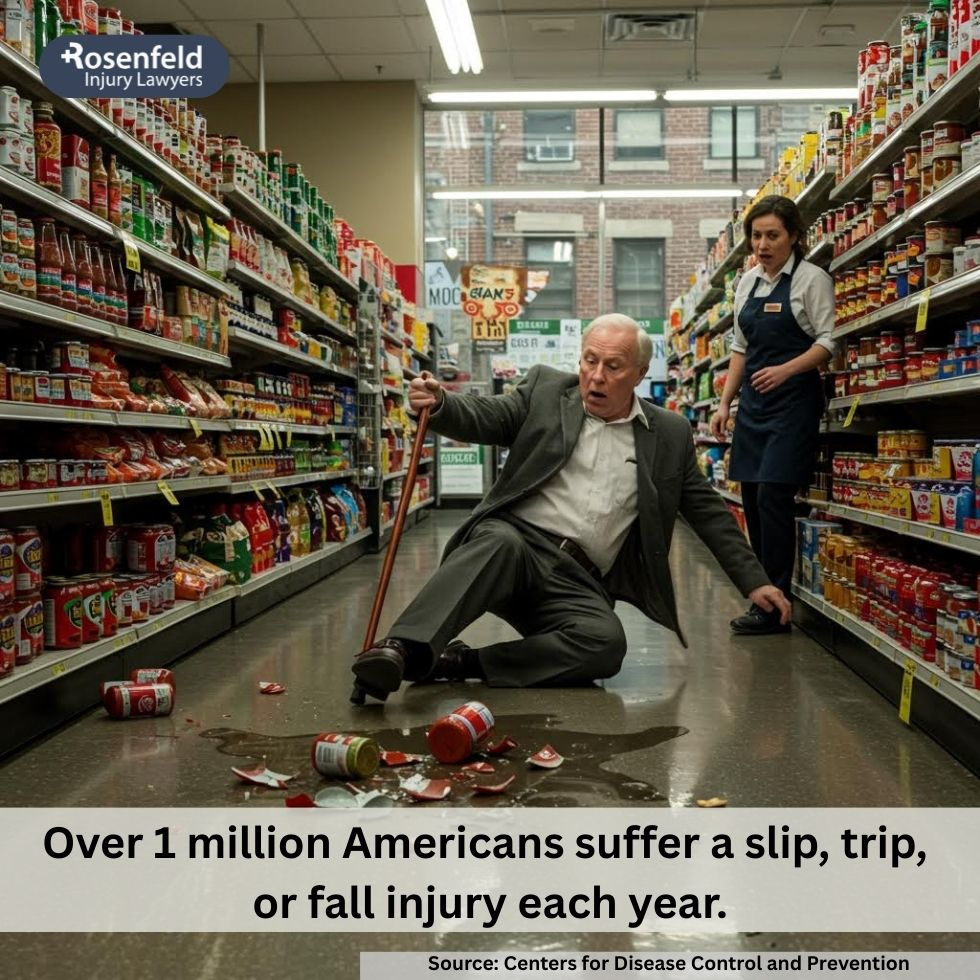
Data by Law.com based on 317 lawsuits filed in Cook County reveals that the median slip and fall accident settlement is around $177,500, suggesting that half of the payouts fall below this amount, often reflecting cases with moderate physical pain or less severe injuries.
In contrast, the average settlement is much higher at $499,745, likely influenced by outlier cases involving significant bodily harm, head injuries, or extensive medical treatment due to a negligent property owner.
Slip and fall settlements depend on individual factors, but reviewing similar past cases can offer some insight. These accidents may allow you to recover monetary and non-monetary damages, with settlements typically higher for catastrophic or permanent injuries. To better understand your potential damages, consult our attorneys or use our slip and fall settlement calculator.
While slips and falls can happen almost anywhere in Chicago, certain conditions make them far more likely to occur. Below are frequent causes of slip and fall accidents, which may lead to claims against property or business owners.
Under the Illinois Premises Liability Act, property owners must take reasonable steps to ensure visitor safety, whether it’s a business on Michigan Avenue or an apartment in Hyde Park.
While they aren’t liable for obvious dangers or unknown risks, they must address hazards that could harm people on their property.
Liability for a slip and fall accident can rest on different parties, depending on the circumstances and location of the accident. Below are examples of who might be held responsible:
Our Chicago premises liability attorneys can help identify the liable parties and fight for the full and fair compensation you deserve.
If you’ve been hurt in a slip-and-fall accident, the law requires that you prove you were legally on the property and that the owner was negligent. The following are the elements required to prove and win a slip and fall case:
To determine liability and reasonableness, the court examines if the defendant knew or should have known about the hazard and whether they acted to fix it or warn others. Factors include property type, hazard severity, how long it existed, and the owner’s response.
When you hire the best slip and fall lawyers in Chicago, slip and fall evidence will be recovered to help you prove negligence.
When pursuing a slip and fall claim in Chicago, it’s crucial to understand that property owners and their insurance companies will often employ various defenses to minimize their liability or outright deny your claim.
Our experienced attorneys are well-versed in these common defenses and are prepared to counter them effectively on your behalf.
Here are some typical defenses you might encounter in an Illinois slip and fall case:
The “Open and Obvious” Doctrine
This is one of the most frequently used defenses. Property owners may argue that the dangerous condition that caused your fall was “open and obvious”.
The Illinois Supreme Court defines the definition of ‘open and obvious’ as “A possessor of land is not liable to his invitees for physical harm caused to them by any activity or condition on the land where danger is known or obvious to them, unless the possessor should anticipate the harm despite such knowledge or obviousness.” Ward v. K-Mart, 136 Ill. 2d 132 (1990). In Sollami v. Eaton, 201 Ill. 2d 1 (2002).
If a hazard is deemed open and obvious, the property owner might claim they had no duty to warn you or protect you from it.
Lack of Notice
The property owner may claim they did not know about the dangerous condition and had no reasonable opportunity to discover or fix it before your accident.
Comparative Negligence (Your Fault)
The defense will often attempt to argue that your own actions contributed to your fall, such as being distracted, not paying attention, or wearing inappropriate footwear. If your percentage of fault is found to be 50% or more, you lose your right to seek compensation.
Natural Accumulation Rule (for Snow and Ice)
In Illinois, property owners are generally not liable for injuries caused by the natural accumulation of snow or ice on their premises. This means if you slip on a natural patch of ice that hasn’t been altered, the owner may not be held responsible.
Lack of Causation
The defense might argue that the dangerous condition on their property did not actually cause your injuries, or that your injuries were pre-existing or caused by something else entirely.
Trespasser Status
Property owners generally owe a lower duty of care to trespassers (individuals on the property without permission). The defense may argue that you were trespassing.
Understanding these potential defenses highlights the importance of having skilled legal representation. Our Chicago slip and fall accident lawyers anticipate these arguments and build robust cases to overcome them, ensuring you have the strongest possible chance of success.
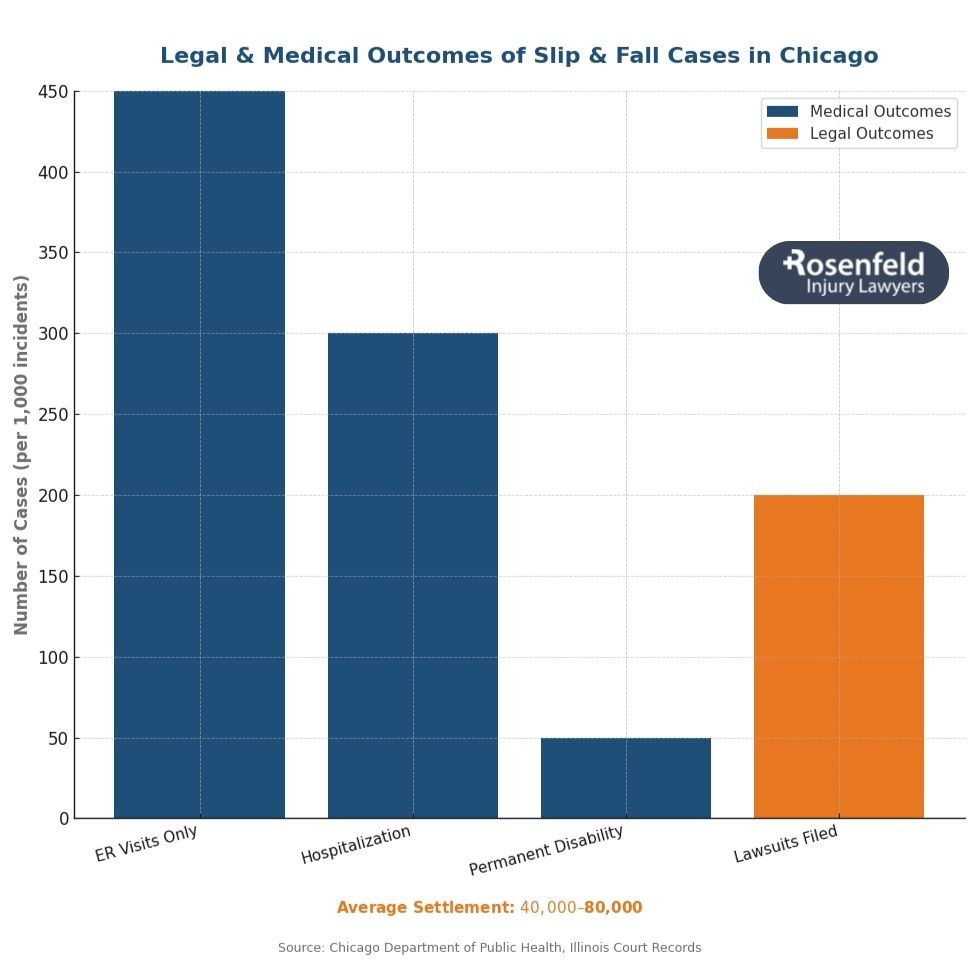
Under 735 ILCS 5/2-1116, Illinois follows a modified comparative negligence model in personal injury cases, including slip and fall incidents. Under this rule, victims can only obtain compensation if they are less than 50% at fault.
For instance, if a facility addresses a spill by marking and cleaning the area, but you ignore warnings or fail to exercise caution, a court may find you more than 50% responsible, barring compensation.
According to slip and fall statistics, these incidents are the second leading cause of accidental death in the United States. Anyone can suffer injuries from a fall, regardless of gender or age. Some common places where slips and falls accidents occur are:
Per 735 ILCS 5/13-202, the statute of limitations for personal injury claims in Chicago is two years from the date of the accident. You will not be able to file a personal injury claim after this time elapses unless your case falls into an exception that extends the deadline.
Also, the sooner you reach out for help, the easier it will be for your lawyer to find the evidence they need.
Recent settlement data from Illinois shows a wide range in compensation values for personal injury claims, including fall accidents. While some cases settle for as little as $5,750, others reach as high as $5.3 million.
Andreas Bakopoulos v. Union Pacific Railroad Co.
In a Chicago case, diesel mechanic Andreas Bakopoulos was awarded $5.45 million after slipping on diesel fuel while working at a railyard. He claimed the railroad failed to provide a safe work environment and proper tools, leading to a back injury and a hernia.
The jury found Union Pacific 60.5% liable, rejecting the defense’s argument that his injuries stemmed from a later car accident. Bakopoulos underwent spinal fusion surgery and experienced lasting physical pain and limitations that affected his ability to work and engage in daily life.
Michael D. Berk v. Pepper Construction Co.
In Chicago, Michael Berk slipped on black ice outside a construction site and fractured his ankle, requiring multiple surgeries over several years. He sued Pepper Construction, claiming the company’s snow removal practices created the hazardous ice buildup.
The defense denied liability and argued Berk was distracted at the time of the fall. Despite complications including infection, chronic pain, and permanent limitations on physical activity, Berk resumed some sports and parenting duties.
A jury awarded him $2 million in damages, covering medical costs, physical and emotional pain and suffering, disfigurement, and loss of normal life.
Maria Garcia v. 6653-55 North Seeley Building Condominium Association
Maria Garcia slipped on an icy, dimly lit stairway at a Chicago condominium and fractured her knee. She sued the property owner for failing to maintain proper lighting, which she argued contributed to the dangerous condition.
Garcia underwent three surgeries, including a knee replacement, and was told she may need another within 10–15 years. The jury found the defendant 62.8% at fault and awarded $1.18 million, later reduced to $740,183.97 due to Garcia’s share of comparative negligence. Her award covered medical expenses, pain and suffering, loss of normal life, and disfigurement.
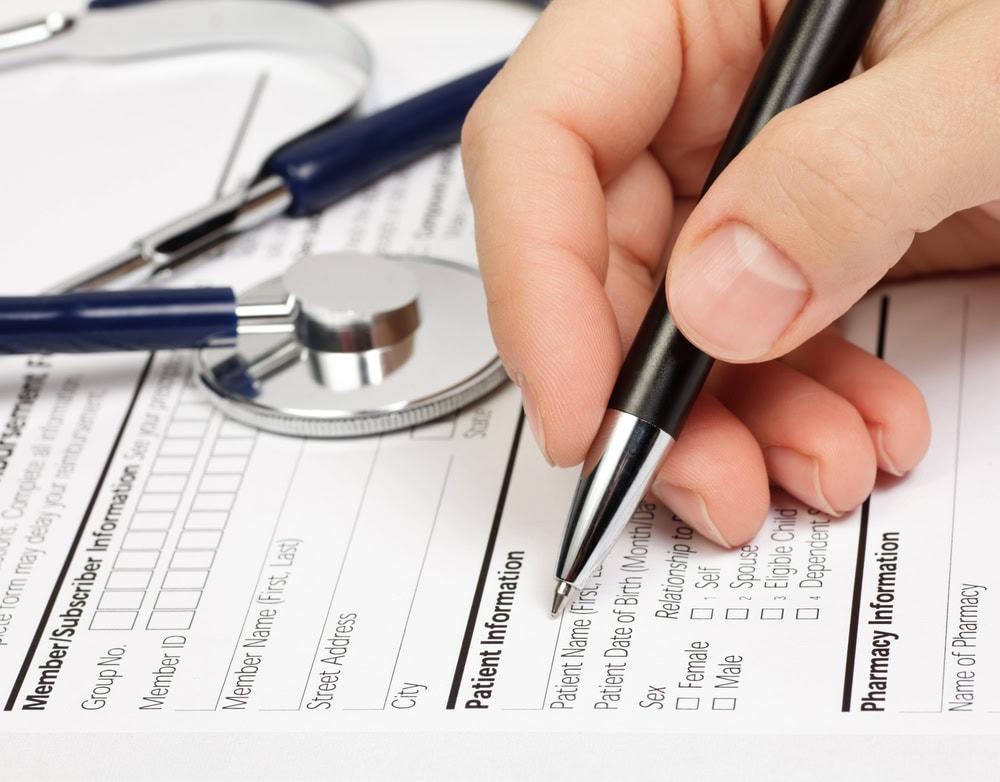
After a slip and fall, prioritize getting medical attention to address your injuries. If possible, report the incident to the police to document the event and request medical help if needed. Once treated, consult a slip and fall lawyer promptly. Your Chicago slip and fall injury attorney can investigate the site, gather witness statements, and obtain medical and first responder reports.
Document the dangerous condition that caused your slip, such as a broken step or slippery floor from a leaky pipe. If the landlord or property manager neglected to fix the hazard, you might recover compensation for medical expenses or lost wages. Keep records of communication with your landlord about the issue. Consult an experienced Chicago slip and fall law firm as well.
Your health insurance may initially cover some costs, but you might still be left with significant expenses after the injury occurred. An experienced lawyer can pursue a premises liability case to seek compensation for treatments. If you secure a fair settlement or court award, that money can pay your outstanding medical bills.
Every case is different, and the complexity of your claim can affect how long it takes. Chicago courts often have busy dockets as well, so the availability of judges is a factor. Additionally, the willingness of the property owner’s insurance company to negotiate will play a part. A slip and fall case can sometimes settle in months or stretch beyond a year.
If you fell at work due to negligence, you might qualify for workers’ compensation benefits to cover medical costs and some lost wages. Additionally, if a third party caused the fall, you could file a premises liability claim to seek damages for pain, suffering, and emotional distress. Consult an experienced slip and fall lawyer to identify the best course of action.
Yes, but suing a government entity often involves strict guidelines for filing notices and meeting legal deadlines. If government entities fail to maintain sidewalks or buildings under their care, you may hold them accountable for your injuries. Because those claims can be complex, it’s always a good idea to consult a top-rated Chicago slip and fall accident attorney.
Generally, Chicago property owners owe no duty of care to adult trespassers unless they acted recklessly or intended to cause harm. However, defendants could be liable for foreseeable risks if a child trespasser is involved.
Even if you feel okay, seeing a doctor is important because injuries like head trauma or spinal cord injuries might not show symptoms right away. Documentation from a medical exam can also support your premises liability case against the responsible party. Quick treatment helps protect your health and your legal claim.
While it’s possible to file on your own, hiring a lawyer can make it easier to gather evidence of someone else’s negligence and negotiate with insurance companies. A trip and fall accident lawyer understands how to prove liability and can protect your rights during the legal process.
Insurance companies tend to take you more seriously the moment you start working with a lawyer, leading to a better settlement offer.
Most slip and fall lawyers in Chicago charge a contingency fee of 33% to 40% of the total recovery, depending on the stage at which the case is resolved.
Check their case results, client reviews, and legal ratings. Ask about past settlements or verdicts in similar cases to gauge their experience.
Look for experience with slip and fall cases, strong communication, local knowledge, and a clear, fair fee structure.
Rosenfeld Injury Lawyers work on a contingency fee basis, so you don’t pay anything upfront. We only get paid if we win your case, typically collecting a percentage of your settlement.
A lawyer can prove fault, handle insurers, and push for full and fair compensation—things that are hard to manage on your own.
Doctors and experts estimate future care needs, which are included in your compensation demand.
Gather strong evidence, document injuries, and negotiate directly—but be cautious, especially if fault is disputed.
They can appeal the denial, strengthen your case, or file a lawsuit to fight for compensation.
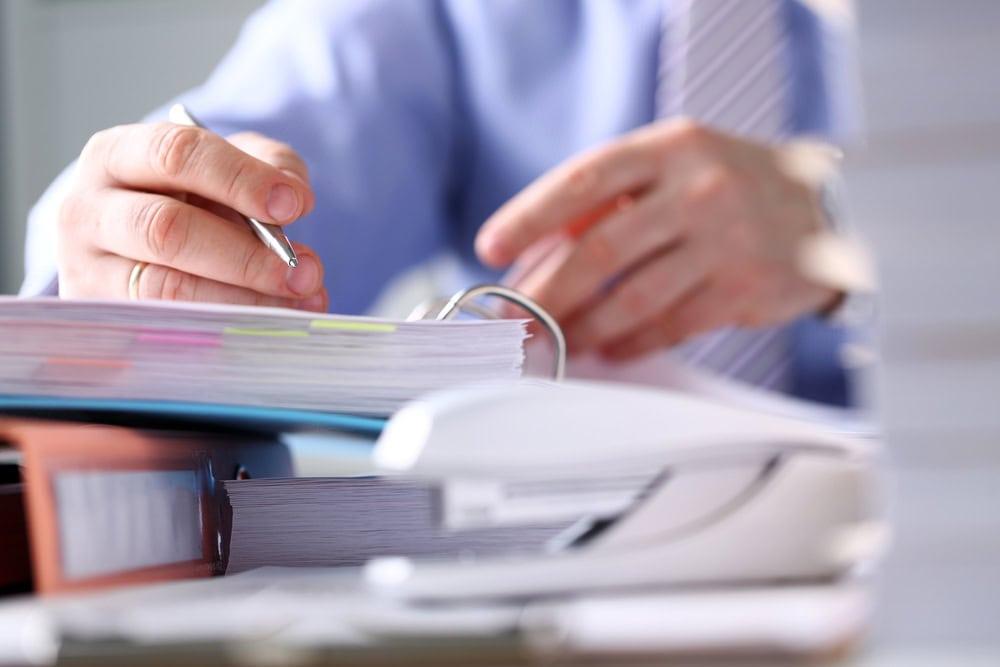
We know the challenges you face after an accident caused by unsafe premises. Our team investigates your personal injury claim, gathers the necessary evidence, and challenges unreasonable insurers.
We work to calculate your damages and secure the compensation you deserve. If you need a dedicated fall accident lawyer, we’re here to help. Reach out for a free initial consultation.

If you are injured in a slip and fall accident, consult with a lawyer as soon as possible to see what your options are regarding the legal process. Our personal injury law firm has successfully recovered millions of dollars for our clients. We work on a contingency basis, so you do not need to spend any money out of your pocket for legal fees.
Contact the best Chicago slip and fall attorneys at Rosenfeld Injury Lawyers for a free consultation by filling out our contact form or calling toll-free at (888) 424-5757. We’re available 24/7 to answer your call. .
Our downtown office, near the Richard J. Daley Center, Dirkson United States Courthouse, and the Chicago Workers’ Compensation Commission, offers convenient access from Aurora, Joliet, and Waukegan via I-90, I-94, and I-290.
225 W Wacker Dr #1660
Chicago, IL 60606
Phone: (847) 835-8895
We also serve clients from Buffalo Grove, Elgin, Peoria, Schaumburg and throughout Illinois.
All content undergoes thorough legal review by experienced attorneys, including Jonathan Rosenfeld. With 25 years of experience in personal injury law and over 100 years of combined legal expertise within our team, we ensure that every article is legally accurate, compliant, and reflects current legal standards.